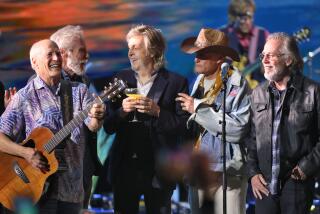Still Fired by the Inspiration of Cannonball : Jazz: ‘Every time I play, it’s a tribute’ to the legendary sax man, says his brother, cornetist Nat Adderley, who will perform with his quintet and an all-star band in a special salute Saturday in Long Beach.
- Share via
With the exception of Charlie (Bird) Parker, no other alto saxophonist has influenced modern jazz as much as the late Julian (Cannonball) Adderley. And nobody knows it better than his brother and band mate cornetist Nat Adderley.
“Every time I play, it’s a tribute to Cannonball,” the saxophonist’s younger brother said earlier this week in a late-night call from his home in Lakeland, Fla. “I’ve done an awful lot of shows, including the one last summer with (singer) Nancy Wilson at the Hollywood Bowl, dedicated to him. But that’s not unique. Every night my band plays, we do something from the Cannonball songbook.”
Saturday, Nat Adderley and his quintet, along with an all-star big band, will dig deeply into that songbook for a “Salute to Cannonball” at the Carpenter Performing Arts Center in Long Beach.
Breaking onto the scene shortly after Parker’s death in 1955, Cannonball Adderley expanded on Bird’s be-bop breakthroughs with his own soulful touches, an approach that humanized bop’s hard, intellectual side.
On the heels of Parker’s quantum leap, Cannonball made jazz friendly to the general public again while capitalizing, not diluting, on his predecessor’s artistic triumphs.
After doing time in the service, the Adderley brothers formed a quintet in 1956, but troubles with the tax man sent Cannonball out looking for work. He landed in Miles Davis’ band, where he replaced Sonny Rollins.
For the next three years, he stood shoulder to shoulder with Davis and tenor giant John Coltrane, contrasting the trumpeter’s spare lyricism and Coltrane’s deep intensity with rhythmically savvy lines steeped in the blues and gospel traditions.
After parting company with Davis in 1959, Adderley enlisted his cornetist brother for his own quintet. The two worked together until Cannonball’s death in 1975. Such musicians as drummers Louis Hayes and Jimmy Cobb, pianists Joe Zawinul, Victor Feldman and George Duke and bassist Walter Booker passed through the band.
When Adderley added a second saxophonist to the lineup, he employed such heavyweights as Yusef Lateef and Charles Lloyd. The group’s impact on the course of jazz in the ‘60s and early ‘70s is still being felt.
*
But no other single musician was as influenced by Cannonball as was his brother. Nat recalled how his brother’s initial instrument was passed on to him.
“It was Cannon who got the trumpet first. My father, who was a cornet player, bought him one when Cannon was 7, and he stuck by it. He was very good with it, but he had built-in problems. He had little endurance for the instrument, and his tooth formation wasn’t really suitable for becoming a brass player. And still he could play very well.”
“We put together this first little band, the Royal Swingers, when we were in high school, and I was the singer. We’d play after football games and such. And finally Cannon switched to the alto saxophone. But he didn’t want Pop to be upset because no one was playing the instrument he had bought, so he started teaching me the trumpet. And eventually I started playing trumpet with the band.”
So how did Nat Adderley come to the cornet?
“One time I put the trumpet down in the high-school auditorium, and it was stolen. So I went to the music teacher to look for another, because I had a gig to make, but they were all checked out. But they had a cornet. Later while I was playing, I realized I had stumbled on to my instrument.”
Adderley said he and his brother got along well while growing up.
“We didn’t have that sibling-rivalry thing. For one, we didn’t play the same instrument. And he was so much better playing than me and everyone else that there couldn’t be a rivalry. I was just happy to play with him.”
After Cannonball died, Nat went through a short period of inactivity. “His death affected me more than I thought. I just couldn’t play with other saxophonists. Nobody sounded like him. It took me some time to get to the point where I could hear the value in other players.”
The first of those other players was Philadelphia native Sonny Fortune, whose Coltrane-influenced sound on alto had fired pianist McCoy Tyner’s distinguished early-’70s combos that included trumpeter Woody Shaw. Adderley was inspired to lead his own band. “A player like Sonny Fortune will get you straight for sure,” he said.
When the Adderley quintet plays for Saturday’s salute to Cannonball, the band will be a deliberate blend of veterans and younger players, according to Adderley.
*
On sax will be rising star Vincent Herring, who has earned critical accolades for his recent albums on the MusicMasters and Landmark labels. Those albums featured such young-generation stars as trumpeter Wallace Roney and pianist Mulgrew Miller.
“Vincent came up once when Sonny was in the band and said, ‘I love Cannonball and I know all the tunes.’ And I said, ‘Yeah, sure, kid.’ And he kept coming in, and so a couple of nights later we let him sit in. Once he played, I knew what he was talking about. He’s been in the band ever since, playing with us while Sonny was still in the band. The critics called it the muscular front line.”
But the group also includes two longtime Cannonball Adderley associates: drummer Cobb, who was in the Davis band with the saxophonist, and bassist Booker.
“Cannon was influential in getting Jimmy to join Miles--he had played with us before joining (the Davis band). And he played with Cannonball’s band for many years. What he saw in Jimmy was the same thing that I see in him now: He’s a master.”
The Nat Adderley quintet will be joined by the big band for the premiere performance of trumpeter Cecil Bridgewater’s piece dedicated to Cannonball.
Among the luminaries in that band will be saxophonists Antonio Hart, Jeff Clayton and Rickey Woodard; trumpeters Brigewater and Oscar Brashear, and trombonists Garnett Brown, Buster Cooper and Thurman Green. At the time of this interview, Adderley had yet to see Bridgewater’s composition (it was scheduled to be rehearsed in Los Angeles), but he was undaunted.
“It’s going to be real jazz,” he predicted. “Jazz is supposed to be unpredictable, and I know this will be the real thing.”
* “Salute to Cannonball” with the Nat Adderley Quintet and all-star big band is Saturday at 8 p.m. at the Carpenter Performing Arts Center, Cal State Long Beach, 6200 Atherton St., Long Beach. $20-$25. (310) 985-7000.
More to Read
The biggest entertainment stories
Get our big stories about Hollywood, film, television, music, arts, culture and more right in your inbox as soon as they publish.
You may occasionally receive promotional content from the Los Angeles Times.










